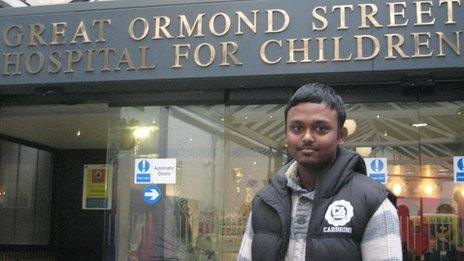Bowel disease expert pleads for children's funding
- Published

Eighteen-year-old Muhammad Miah has never been able to eat.
While many people are trying to eat less after the excesses of the festive season, Muhammad cannot even drink tap water.
"The water has got to be boiled or be mineral water otherwise my gut doesn't like it. My stomach is very sensitive."
A serious gut condition means he has had to rely on artificial nutrition since birth.
During the day his meals come in liquid form, containing protein, carbohydrate, fat, water, minerals and vitamins.
At night a pump feeds more nutrients directly into his stomach via a special tube.
In the past he has had to rely on being fed intravenously, where the contents of the feed bypass the usual processes of eating and digestion.
There was a particularly bad spell a few years ago, Muhammad recalls.
"My gut stopped working at all. I couldn't even have liquid nutrition or water. It was a case of 'nil by mouth'. That lasted several months."
Nerve failure
Known as intestinal pseudo obstruction, Muhammad's rare condition is thought to affect 12 to 15 children in the UK.
The intestines lose the ability to push food, stool or air through the gastrointestinal tract.
Doctors at Great Ormond Street Hospital in London, where Muhammad has been treated, believe that his particular condition is caused by a failure of the nerves within the smooth muscle of the intestines, something known as hollow visceral myopathy.
But he still see a potential positive side to his condition.
"Sometimes I think I'm healthier than other people. When you think about all the junk food people are eating... at least I won't get fat."
Doesn't he ever get desperate to devour a proper meal?
"My feeds are so well timetabled now that I don't really get hungry, to be honest. And when I'm really unwell I don't feel hunger anymore. It's just normal to me."
Despite his brave attitude, the condition has had a major impact on Muhammad's life.
Although he is managing to pursue his studies at Newham College and hopes to go on to university next year, he has days when his energy levels are very low and he struggles to get out of bed.
'Knife edge'
Dr Nikhil Thapar, senior lecturer in paediatric gastroenterology at University College London's Institute of Child Health, says there is an urgent need to understand gut conditions better.
"We can only control the symptoms at the moment. The treatment is just allowing patients like Muhammad to survive. We don't offer any cure.
"But we want to look at why these birth defects develop in the first place, and do some research looking at stem cells to grow some of the missing nerves."
Dr Thapar acknowledges that children with intestinal pseudo obstruction have a lifelong problem which they cannot change.
"These children are very brave, despite everything.
"They can have a very poor quality of life, be in and out of hospital every week and suffer severe constipation and blood clots.
"They are often living on a knife edge."
Great Ormond Street Hospital in London has recently been designated the national centre for diagnosing and treating children with the condition.
"Bowel problems are so common," says Dr Thapar.
"Fifty per cent of children suffer from bowel problems at some point."
In an effort to raise awareness and money for bowel disease research, Dr Thapar is climbing Kilimanjaro in February.
After many operations, Muhammad's energy levels would not allow him to take part in such an exhausting challenge.
But he is hoping that the trek and any future research will have life-changing implications for him.
- Published26 December 2011
- Published16 April 2011
- Published26 August 2010